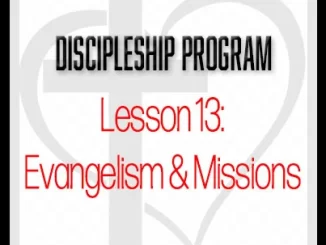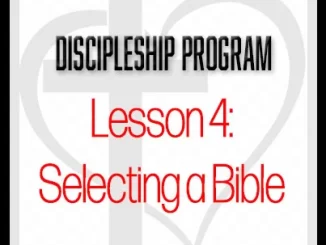As newer believers we may feel we are not qualified to serve others or serve in the church, but don’t give in to that lie. None of us are qualified, but God qualifies us and works through us (2 Corinthians 3:5-6; Ephesians 2:10). Think of it as learning on the job. We learn by doing, and by our obedience we are engaging in an act of worship to God.
Each of us has special talents and gifts. Some people are naturally better at something than others. Each of us is blessed with at least one spiritual gift (1 Corinthians 12:7). These are specific ways the Holy Spirit is manifested through us in our lives. And through these gifts we are to serve others.
We see in 1 Peter 4:10, “Each of you should use whatever gift you have received to serve others, as faithful stewards of God’s grace in its various forms.”
That tells us we should be serving one another. We have been given a gift from God, and we are not to hoard that gift or hide it away. We are to glorify Him and use it in service to others.
Gifts of the Spirit
The following list is known as Spiritual Gifts and come from God. Most people have at least one of these gifts, if not more. There are tests you can take online that help you to identify your spiritual gifts which will help you determine where you would best serve.
- Administration: the divine strength or ability to organize multiple tasks and groups of people to accomplish these tasks (Luke 14:28-30; Acts 6:1-7; 1 Corinthians 12:28)
- Apostleship: the divine strength or ability to pioneer new churches and ministries through planting, overseeing, and training (Acts 15:22-35; 1 Corinthians 12:28; 2 Corinthians 12:12; Galatians 2:7-10; Ephesians 4:11-14)
- Craftmanship: the divine strength or ability to plan, build, and work with your hands in construction environments to accomplish ministry applications (Exodus 30:22; Exodus 31:3-11; 2 Chronicles 34:9-13; Acts 18:2-3)
- Discernment: the divine strength or ability to spiritually identify falsehood and to distinguish between right and wrong motives or situations (Matthew 16:21-23; Acts 5:1-11; Acts 16:16-18; 1 Corinthians 12:10; 1 John 4:1-6)
- Evangelism: the divine strength or ability to help non-Christians take the necessary steps to becoming a born-again Christian (Acts 8:5-6; Acts 8: 26-40; Acts 14:21; Acts 21:8; Ephesians 4:11-14)
- Exhortation: the divine strength or ability to encourage others through the written or spoken word and Biblical truth (Acts 14:22; Romans 12:8; 1 Timothy 4:13; Hebrews 10:24-25)
- Faith: the divine strength or ability to believe in God for unseen supernatural results in every part of life (Acts 11:22-24; Romans 4:18-21; 1 Corinthians 12:9)
- Giving: the divine strength or ability to produce wealth and to give by tithes and offerings for the purpose of advancing the Kingdom of God on earth (Mark 12:41-44; Romans 12:8; 2 Corinthians 12:9, 2 Corinthians 28)
- Healing: the divine strength or ability to act by the laying on of hands for the healing of physical and mental illnesses (Acts 3:1-10; Acts 9:32-35; Acts 28:7-10; 1 Corinthians 12:9)
- Helps: the divine strength or ability to work in a supportive role for the accomplishment of tasks in ministry (Mark 15:40-41; Romans 16:1-2; 1 Corinthians 12:28)
- Hospitality: the divine strength or ability to create warm, welcoming environments for others in places such as your home, office, and at church (Acts 16:14-15; Romans 12:13; Romans 16:23; Hebrews 13:1-2; 1 Peter 4:9)
- Intercession: the divine strength or ability to pray for someone, something, or someplace, believing for profound results (Hebrews 7:25; Colossians 1:9-12; Colossians 4:12-13)
- Knowledge: the divine strength or ability to understand and bring clarity to situations or circumstances, often accompanied by the Word of God (Acts 5:1-11; 1 Corinthians 12:8; Colossians 2:2-3)
- Leadership: the divine strength or ability to influence people at their level while directing and focusing them on a great vision or idea (Romans 12:8; 1 Timothy 3:1-13; 1 Timothy 5:17; Hebrews 13:17)
- Mercy: the divine strength or ability to feel empathy and to care for those hurting (Matthew 9:35-36; Mark 9:41; Romans 12:8; 1 Thessalonians 5:14)
- Miracles: the divine strength or ability to alter the natural outcomes of life in a supernatural way through prayer, faith, and divine direction (Acts 9:36-42; Acts 19:11-12; Acts 20:7-12; Romans 15:18-19; 1 Corinthians 12:10)
- Missionary: the divine strength or ability to reach others outside of your culture and nationality (Acts 8:4; Acts 13:2-3; Romans 10:15)
- Music/Worship: the divine strength or ability to sing, dance, or play an instrument for the purpose of helping others worship God (Deuteronomy 31:22; 1 Samuel 16:16; 1 Chronicles 16:41-42; 2 Chronicles 5:12-13; Psalm 150)
- Pastor/Shepherd: the divine strength or ability to care for the personal needs of others by nurturing and mending life issues (John 10:1-18; Ephesians 4:11-14; 1 Timothy 3:1-7; 1 Peter 5:1-3)
- Prophecy: the divine strength or ability to boldly speak and bring clarity to Scriptural and doctrinal truth (Acts 2:37-40; Acts 7:51-53; 1 Corinthians 14:1-4; 1 Thessalonians 1:5)
- Service: the divine strength or ability to do small or great tasks in working for the overall good of the body of Christ (Acts 6:1-7; Romans 12:7; Galatians 6:10; 1 Timothy 1:16-18; Ephesians 4:11-14)
- Teaching: the divine strength or ability to study and learn from the Scriptures primarily to bring understanding and depth to other Christians (Acts 18:24-28; Acts 20:20-21; 1 Corinthians 12:28; Ephesians 4:11-14)
- Tongues: the divine strength or ability to pray in a heavenly language to encourage your spirit and commune with God. Often accompanied by interpretation and to be used appropriately (Acts 2:1-3; 1 Corinthians 12:10; 1 Corinthians 12:10; 1 Corinthians 14:1-14)
- Wisdom: the divine strength or ability to apply the truths of Scripture in a practical way, producing the fruitful outcome and character of Jesus (Acts 6:3; Acts 6:10; 1 Corinthians 2:6-13; 1 Corinthians 12:8)
Examples of Service
Below you will find just a few examples of ways you might get involved. If you are interested in serving, find an organization you can volunteer in or talk to your local church. Don’t settle for filling an empty spot on their team. You want to serve in a role that will allow your spiritual gift(s) to be used. Find a role that gives you joy and purpose. You don’t want your service to be a job that you dread doing or don’t look forward to.
- Serving the Needy
- Opening doors and greeting people at church
- Caring for the sick or injured (hospital visits, home visits, etc.)
- Be on the worship team
- Evangelism and sharing faith (missions, outreach opportunities, etc.)
- Teaching in children’s ministries
- Serving in the nursery or early childhood ministries
- Lead small groups and Bible Studies
- Cleaning the church
- Construction, set up, tear down, etc.
- Serving on a media team or in production
Study Questions
- How would you explain spiritual gifts to someone? How does a gift help with serving?
- Some people believe spiritual gifts have all ceased and are no longer active. What do you think?
- Think about the church you are currently attending or have attended in the past. Think of things you have seen people doing to serve. What service role can you see yourself doing in your home church?
Think About It
Find a quiz or inventory online that you can use to help you determine your spiritual gifts. Did the results surprise you? Did it turn out how you thought it would?
Discipleship Program Index | Lesson 9 | Lesson 11








Be the first to comment